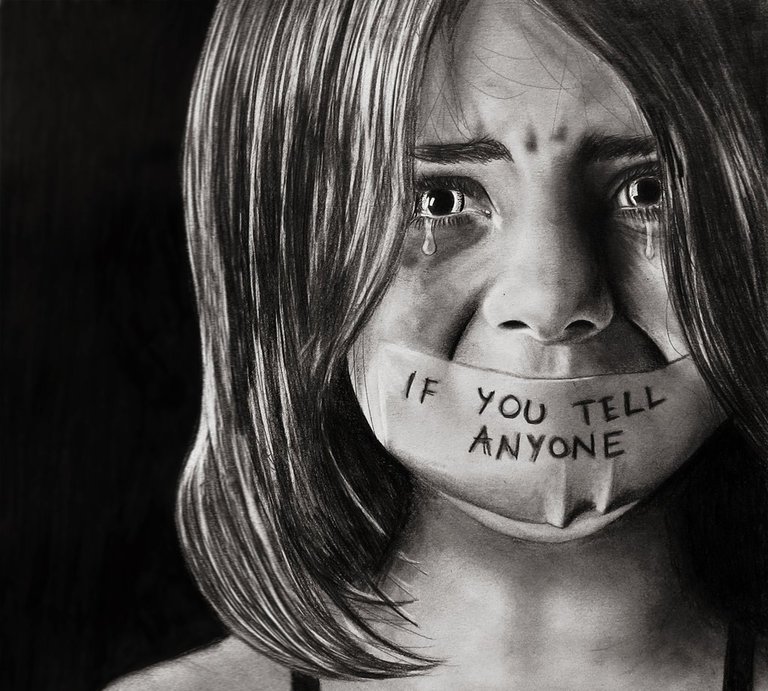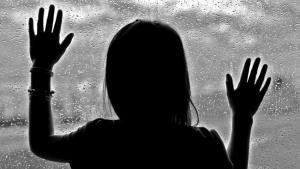
Children are not property. That is a ghastly idea. If a person owns another person, that is called slavery. That person is chattel. If children are considered chattel, they become vulnerable to spanking, abuse, manipulation, neglect, and maltreatment, which can psychologically and physically harm them.
Thus, when adults view children as slaves, they see them as disdainful and disgusting creatures. It lowers the child to a nonentity, who must obey parental dictates without question and accept irrational rules because the parent "said so."
And tragically, children have been considered property since time immemorial. This has been the unspoken rule of society. They have had few rights and little freedom.
Parents feel authorized to hit and beat them when they "step out of line," or simply as an outlet for underlying rage. Some cultures even view children with such low esteem that the adults brutalize them to the point of inculcating them with a propensity for violence and an endless love affair with mass murder called warfare.
The founder of psychohistory, Loyld DeMause has elaborated on this:
"The source of most human violence and suffering has been a hidden children's holocaust throughout history, whereby billions of innocent human beings have been routinely murdered, bound, starved, raped, mutilated, battered, and tortured by their parents and other caregivers, so that they grow up as emotionally crippled adults and become vengeful time bombs who periodically restage their early traumas in sacrificial rites called wars."
Churning out Violent Children Props up Mass bloodshed, but Times may Change
People ought to be ashamed at the the state of life for children. If children aren't treated as humans, with dignity and decency, no one can expect to have a decent and dignified world.This is why people can continue to expect mass bloodshed and violence, because they taught their children that abusing, enslaving, and harming others is the norm. But sadly, everyone pretends that violence and debauchery are just facets of "human nature." In truth, this is a collective delusion, wielded to brush off responsibility.
Things have to change. A world built on the edifice of harming children is no world anyone really wants to live in.
I am just glad that more people are starting to value safety and affection for kids. They are starting to see that treating children with love and individuality are the only ways to raise them with respect and appreciation for others. Harming and enslaving children is a recipe for planetary disaster.
It is the formulation for life that will make ghosts of everyone, sooner rather than later.
The history of childhood is a nightmare from which we have only recently begun to awaken. The further back in history one goes, the lower the level of child care, and the more likely children are to be killed, abandoned, beaten, terrorized, and sexually abused. It is our task here to see how much of this childhood history can be recaptured from the evidence that remains to us. That this pattern has not previously been noticed by historians is because serious history has long been considered a record of public not private events. Historians have concentrated so much on the noisy sand-box of history, with its fantastic castles and magnificent battles, that they have generally ignored what is going on in the homes around the playground. And where historians usually look to the sandbox battles of yesterday for the causes of those of today, we instead ask how each generation of parents and children creates those issues which are later acted out in the arena of public life.
-
Ch. 1, The Evolution of Childrearing, opening paragraph.

My name is Sterlin. Follow me @ Psychologic-Anarchist. I also run the Psychologic-Anarchist Facebook page and produce many YouTube videos. My interests lie in the intersection of counseling psychology and anarchism. I write about the depredations of psychiatry, and also the new philosophy of compassionate anarchism. We have a large community devoted to discussing psychology and relational voluntaryism.


Wow, what a wonderful piece Sterlin! I'll have to dig into The Evolution of Childrearing in the near future.
Very much looking forward to seeing you at Anarchapulco this winter. The details haven't been announced yet, but I know Dayna Martin will be doing some kind of workshop again this year, I highly recommend taking part in it :-)
Absolutely Kenny. I can't wait to meet everyone and share some ideas with folks.
I will look into Dayna's workshop. Thanks!
Sterlin this is so important to understand. Dehumanization paves the way for immoral acts. Thank you for continually naming the beast, so to say.
Hi, Sterlin! I love your work and was wondering if you had any thoughts on my post outlining the an-cap perspective. You certainly have some insights that I lack and I would love your feedback.
https://steemit.com/anarchism/@derekareith/so-you-re-seeing-a-lot-of-anarchist-posts-but-you-re-not-anarchist-wtf-is-going-on
BTW, great post, I've always disliked Rothbard's perspective on children as property...
Peaceful parenting FTW!
👍save children in the future

I really love this gif. Thanks.
It s great to see that this platform is not only used to make a lot of money.
Great Post :)
I take a drastically different approach to this problem but I have the same intentions as you Sterlin. You know I'm a proponent of peaceful parenting. However, I would contend that children and adults alike would be better off if we recognize that bodies ARE actually property. The important distinction to make is that the best link to each body is that body's free will, thus every individual is the owner of their own body - even children. The fact that children are born in a state of incapacity doesn't mean the parent owns the child in the child's stead; it means the parent is charged with stewardship until the child has been raised out of this state of incapacity. This means that the parent should make rational decisions to preserve the bodily integrity of the child that they think the child would make if the child was able. This does not give the parent a license to verbally abuse or physically beat a child but rather puts an ever greater charge of ensuring that the child comes to no harm. By recognizing the child's property right to their own body, we can frame aggressions against children as what they are (trespasses) and they can be dealt with accordingly
Friend, I don't think we approach this in drastically different ways at all. We might use different language and ways of expressing the idea, but I essentially said the same thing as you and agree with your position.
I never stated or implied that a child does not have property rights or ownership over their own bodies. I just said that children are not property in the sense of being owned by their parents. I.E. They are not chattel. And this position is right in line with yours so far as I can tell.
Thanks for the comment.
I wholeheartedly agree with you.
Wonderfully put. I'll have to use this logic the next time i come up against the "It's MY child!" argument. That's not to say I believe a total stranger has just as valid a claim as the parent, but that the "It's MY child!" argument isnt cart blanche to do anything to said child. I got a little long-winded there, but good post!
Children are people, too.
If children are not property of their parents, then parents are not property of the children. The logical conclusion is that there is no obligation for parents to care for children. It then follows that child support laws are pure slavery.
Children should be raised by people who love them and care for the voluntarily.
Now the question becomes who gets to decide where a child lives and what standard of living is acceptable? Is it enough that a child is fed a prison diet and has a place on the floor to sleep?
Given a dispute between two adults about how to care for a child, on what grounds should the dispute be resolved? Is there a "parenting right" that shall not be infringed?
@dantheman Neither is the other's property, but the parent(s) made decisions to bring that child into the physical, and thus have some responsibility to them. The child is incapable of taking care of itself, or even getting itself into the care of someone else, they are basically prisoners, and it's pretty generally accepted, even in Euro-American culture that you have to care for your prisoners.
I highly recommend checking out Stefan Molyneux's podcasts on parenting & childhood development, he includes a lot of great guests and research. Start with the oldest posts, and pick a title that speaks to you.
The key right now is a cultural shift, getting people to understand how humans develop and the kind of damage that is being done. As long as the masses accept things like mass murder (they call it "war") and assaulting children (they call that one "spanking") as normal & acceptable, nothing is going to change this.
As far as child-support, settling disputes, creating standards, etc., the key is doing things in the least violent way possible. If we can change cultural values instead of making violent threats (calling them "laws"), then we get a longer lasting, more effective solution, rather than just a different kind of violence. We don't need to have the perfect solutions right now in order to know what doesn't work and start moving away from it.
These are interesting questions: What determines what is best for a child? I think that completely depends on what you want to get out of them, what do you want them to learn? Think of it like programming a computer. Abuse and neglect program into the child violent tendencies and low self esteem, which can lead to drug and other addictions and other problems which plague individuals and society. Love and positive discipline will lead to happy, well adjusted adults who can handle the awful things life throws at everyone. I've seen both sides of the spectrum as I've worked in youth drug treatment facilities and known a variety of people.
OK, you feed the child simple food (what do they feed folks in prison, anyway?)and you can't afford a bed. Maybe you intend to teach the child humility, gratitude for simple things in life. Maybe you can't afford more than basic necessities. But in the long run, those things don't matter as much as how much time you spend with your kids playing and laughing.
After all, if fancy beds, exotic food, and all the toys in the world created happy, well adjusted adults then wealthy people would never have problem teenagers or suicides.
I don't think children benefit from fancy food... they prefer mac and cheese any day.
Things don't matter, love does.
The purpose of child support laws are to make sure a child is taken care of. Believe me, it is difficult to raise a child on a single income. Difficult to pay rent, plus work, plus help with homework, plus buy food and clothing. Forget about ever doing anything fun or having a car with an air conditioner.
A parent accepts responsibility for care of the child when they bring a child into the world. If they cannot or choose not to take responsibility, then adoption would be an option. You are correct, children should be raised only by people who do so voluntarily.
And then, when the parents are too old to take care of themselves, it would then be the child's responsibility to take care of them. It balances out, it isn't slavery.
I think the point of the article is to say that parents should treat their children with love and respect, rather than as little people to be punching bags or objects of any kind.
For that matter, all people of any age or relationship should be treated with dignity and respect, but that would be the subject of another article!
@casandrarose speaks from a place of authenticity here.
She is not only a hard working single mom who found herself in really bad position when her husband suddenly lost his job to an H1B. She's also a trained child psychologist, who while working as a youth treatment counselor got to see every day what happens to children who's parents don't feel that they owe a significant duty of care to their progeny. She also works with the disabled & handicapped as well as finding time for insightful commentary like this.
@casandrarose Thanks for this, upvoted.
@sterlinluxan This was a well thought out and insightful commentary. Normally I try to pop in and offer constructive criticism or at least a counter point because many posts I choose to respond to are simply biased or unbalanced. Nothing to deconstruct here, nothing to criticize. I'd rate this as the absolute best post I've seen today. So don't take my lack of insightful commentary here as a negative. Wish I could upvote you more than once!
"parenting right" that could not be infringed. However those days were back when most folks in a town knew each other. A grand parent, or aunt or uncle, or neighbor could step in and give advice when they saw abusive or deplorable conditions and that would be enough to change the behavior in the offending parent.@dantheman There used to be a
Our society has decided that this system didn't scale. So now we have a nanny state where a homeless family can lose their kids if they seek help instead of actually getting a hand up.
Now we live in a world of "hand outs, not hand ups". You have to rely on the state to be the judge, jury and executioner of what is and is not good parenting. You have to rely on the state to select "better parents than you", and then pay them money to raise your kids for you while you are now "in the system" and trying not to get lost in the shuffle.
That is the world we have made. Only we can fix it.
Only way to fix it is to decide right here, right now that we're going to change it.
Steemit is a great step in the right direction, but more needs to be done.
As a society we need to move away from "What can I get from my neighbor?" attitude to "What can I do for my neighbor?". At that point we're no longer the same person, we're better.
While parents are not property of their children, they are responsible for creating a human that is dependent on the parent for survival. It is now their moral responsibility to take care of the child.
As far as who makes caretaking decisions, standard of living and parental 'rights', I think this is all resolved if start respecting the will of children. If a child can choose to leave their parent and go with a new willing caretaker, I don't think we would have to worry about concrete beds and prison diets. If there is disagreement on how to care for a child, tiebreaker should be the will of the child. I think that is the point of this article and others like it. Children are people. Respect them as other human beings.
The will of the child cannot be relied upon for the first 5+ years of their life. An abused child will "choose" to stay because "fear of the unknown" is worse than the abuse they have.
The point of my comment is that while parent's shouldn't use violence, they have no obligation to do anything for the child beyond keeping them alive. A child who does not obey can be denied freedom of movement (grounded), denied toys, and they can be denied all but minimal food necessary to keep them alive, etc.
All of these tactics are non-violent, yet they can have far greater psychological impact on the kids than a slap or spanking.
I am an advocate of non-violent solutions to problems, but the issue of kids/elderly/disabled is one that is very hard to resolve in an objective way.
Oh, I disagree. What about loving the child, teaching them good manners (subjective, I know), promoting a nurturing environment for the child (emotional, social, physical, etc), to name but a few?
If all a parent does is keep the child alive, to me that is not a very good parent.
If tossing someone in a dark corner, denying them movement, contact with other humans, learning opportunities, sunlight, more than the bare minimum maintenance food, recreational time (and so on) is non-violent, then I do not think "non-violent" means so much anymore.
I usually agree with and enjoy reading your views on random stuff (from way before steemit even existed), but on this I will have to disagree 100% - unless I grossly misunderstood you.
Actually, I think your second and last paragraphs can give us the answer to these problems. Is society OK with doing the things in paragraph 2 to the elderly and disabled? If not, then it is not okay to do those things to children. That is the point of this article and others like it. Children are not some sub species of human. The idea of punishments and gaining compliance through fear, intimidation and/or pain needs to become obsolete and shamed.
@dantheman I like this response. I think something that this post does too much of is assuming that children are often the victims of hitting, etcetera. I think that the large majority of children are well taken care of, or at least looked after in a positive way more than negative.
Children are essentially humans who do not have the ability to take care of themselves, so they need the parent to help them out. In this situation, it sort of is involuntary for the child to rely on the adult. However, services such as adoption exist to help move the child from a home where which the adult does not want to voluntarily take care of the child into a home that is more than happy to take care of them. And if the deal is that the adult takes care of the child who lacks the means to take care of themselves, then they should follow the orders of the adult so they don't make mistakes and get hurt.
Idk if that makes sense, or even if I made a point, but I think the post focuses way too much on the negative, and that it makes logical leaps in determining that the lack of freedom a child has (when they can't even take care of themselves) is what causes war and destruction.
"I think that the large majority of children are well taken care of, or at least looked after in a positive way more than negative."
Do you spend time around many families?
I've interacted with a lot of families, both in and out of the "system." I think most parents do the best they know how to do, and while tempers flare, and no parent is perfect, most parents do a pretty good job.
Of course there are always those who don't do their best and would benefit from positive interventions. I think within a few years, child abuse and neglect will be a thing of the past.
Peaceful parenting is so important topic that it cant be emphasized enough. Thanks for raising the issue, hopefully we can end domestic abuse in the future.
Thanks, friend. I agree completely.
It disgusts me to my core when I read about such atrocities happening to innocent children around the globe. The world really needs a revamp ASAP. We fucked up. At the age when they should be happy beyond bounds, they are having to tolerate such devilish acts. I hope something is done by everyone to bring this menace to an end.
Sometimes I wonder where all of you people are from ..
Kids are happy around here.
Indeed. Good thoughts. I believe education and trying to alter culture can help push us into the direction we need to go.
I am fascinated with this topic. I believe this is the key to world peace: Treat our children with love and respect, discipline them with dignity and reason, empower them with love, and the next generations will see peace.
Not just peace among nations, but peace in individual hearts. Happy, well adjusted people don't turn to drugs or therapy to feel better. They don't turn violent.
I think soon that violence of children will be a thing of the past. That will be a day of world peace.
It sure is a good start, but I do not think that it guarantees the outcome you want, by any means.
There are, after all, countless cases of kids who had a good upbringing who then proceeded to inflict great pain on themselves and others.
The reverse must also be true.
Not necessarily Karnal, because there is a lot of hidden abuse and violence in children's upbringing. This, many kids who we might suspect had "good upbringing" actually did not. Check out Alice Miller's book on this topic. It's called For Your Own Good.
Thanks for the discussion!
I read about this boy a few weeks ago. It's not for the weak.
http://www.bbc.com/news/uk-scotland-edinburgh-east-fife-36333032
Hi Sterlin. I am feeling very connected to your writing atm and wanted to say thankyou and share this - I've known the concepts expressed in this article with my heart since I was a small child. Sadly, in order to survive (gain favour from those i was dependent on ie. caregivers and educators), I had to repress the knowledge. The ensuing years were lived with inner torment and confusion until I discovered others that were actually living my repressed truth. If we raise our children using any kind of punishment, fear tactics, control or coercion, this becomes their blueprint for living. Survival tactics, competition, comparison, power, 'get over it', 'stop crying' smacking, inequality, repression etc... these are not love. Yet people that 'love' their children and the institutions we place our children in teach it every single day. I acknowledge that many individuals within these institutions do their best to respect the autonomy of each child. Oh and btw, the people I found living this way are known as radical unschoolers.
"The further back in history one goes, the lower the level of child care, and the more likely children are to be killed, abandoned, beaten, terrorized, and sexually abused. "
I'm not so sure that's the case if you count "prehistory" with "history" as I do. from the book The Ohlone Way, I got a sense that children in the northern California coastal tribes were very well cared for. I can't say how well that extrapolates to other indigenous peoples, I'm not well read on that subject.
I wonder: could we look into a society's amount of warfare and compare it to child rearing practices? Years ago, I took a university class in Social Anthropology and learned about 2 regions in New Guinea. In one, rampant child abuse took place as a cultural norm... and one fourth of the adult males died in tribal warfare. In the other, child abuse was not a thing. The women had many rights, too, and they enjoyed a peaceful society. It was so long ago, I don't remember all the details.
But my point is, if you want to find a society, ancient or modern, that didn't engage in child abuse as a common thing, look for the most peaceful societies. It would be an interesting anthropological inquiry.
Here is a better explanation for the relationship between parents & children: http://tiny.cc/skepticism